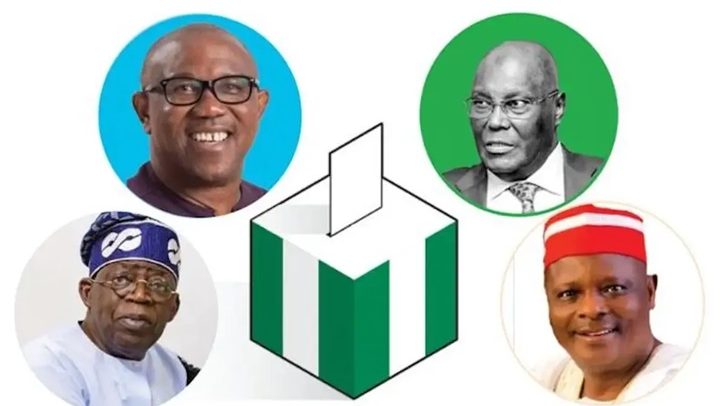Some presidential Candidates during the just ended Nigeria elections
IN my comment on the Nigerian presidential election in my column on 4th March 2023, I described the Chairman of Nigeria’s INEC, Prof. Mahmood Yakubu, as complacent and “insouciant”.
As such, he will probably dismiss the criticisms made by the European Union mission and other observers about INEC’s performance.
But INEC cannot dismiss the recommendations for improving its work made by a high-powered observation team sent to Nigeria by the African Union (AU).
The AU team included two former African Presidents – former President Uhuru Kenyatta of Kenya and former President Thabo Mbeki of South Africa.
Now, a few years ago, Mr Kenyatta witnessed bloodshed and serious hardships descend on his country as a result of post-election violence.
President Mbeki, on the other hand, was the man who organized the African National Congress to defeat the shenanigans of the apartheid-mongers and wrest power from the hands of the white minority, in South Africa’s first-ever democratic elections; perhaps the most crucial ever to take place on Planet Earth.
Their factual report on what they saw of the Nigerian elections is extremely objective and contains constructive suggestions that can be implemented by Nigeria without much difficulty, to organise future elections.
The AU observer team stated: “The people of the Federal Republic of Nigeria went to the polls on 25th February 2023 to elect their President and Members of the National Assembly. This was the seventh successive general elections since the return to multiparty democracy in 1999.”
The Observation Mission comprised ninety (90) observers drawn from thirty-two (32) AU Member States and was supported by a five-member Expert Team. This Mission was preceded by a Special Pre-election Political Mission that took place in December 2022.
“The Mission engaged with key stakeholders including the Independent National Electoral Commission (INEC), the Chief Justice, security agencies, the National Peace Committee, presidential candidates, the African Group of Ambassadors accredited to Nigeria, international election observation missions, civil society organisations, the media, among others.”
In what is described as “this preliminary statement”, the Mission said it was offering “a summary of its key findings and recommendations on the electoral process up to the closing and counting of the polls.
The statement was being issued “while the collation of election results” was still ongoing and the Mission would continue “to closely follow the electoral process and provide a detailed final report at a later stage.”
The statement went on to describe the Nigerian electoral environment as “generally peaceful, despite isolated incidents of violence.” The statement pointed out that polls took place “against the backdrop of a cash crisis following the redesigning of the Naira currency.” The timing of the currency change “impacted on the economy as well as the logistical operations of INEC, the campaign process and the conduct of election observation, among others,” the statement observed.
Significant progressive reforms were a key feature of the 2023 general elections, (the AU mission continued.) As result of the reforms, INEC registered 93,469,008 voters of which 47.5% were women. This marked an 11.3% increase from the number of voters recorded in the 2019 general elections.
However, in the judgment of the mission, “the elections took place amidst general insecurity in the Northwest, Northeast, Southeast, and South-South geopolitical zones. Security issues presented a challenge to the conduct of the elections”, as signified by attacks on INEC offices, personnel and material before the elections.
In 95% of polling units visited by the mission’s personnel, “the atmosphere was generally calm and peaceful, except for isolated incidents of violence in Kano, Lagos, Delta, Abuja, and Cross River. But INEC decided to reschedule polls to 26 February 2023, in specific areas where voting could not take place due to insecurity or logistical reasons.
However, the mission was critical of the fact that “83% of the polling units visited opened late. The average delay was over an hour; in some cases they opened as late as 11:00am. This was largely due to the late arrival of polling officials and materials as well as slow set up of the polling units.”
Voting and counting took place in an open and transparent atmosphere in the presence of observers, party agents and media. Election procedures designated 8:30am to 2:30pm as the voting time.
The Mission declared that “Six hours do not provide a sufficient voting timeframe, considering the huge voter population in Nigeria, the largest democracy in Africa. In many cases witnessed by the AU observers, voting time was extended several hours beyond the 2:30pm official closing time due to a significantly large number of voters in the queue.”
The Mission noted “an unbalanced allocation of voters per polling unit.” And it commended the innovation of using “BVAS” (biometric technology) to accredit voters. This [generally] enhanced the credibility of the process.
Counting took place in an open and transparent environment and Polling staff were “generally competent in carrying out their duties” although, in few cases “some polling officers did not know how to effectively use the BVAS machine.”
The Mission recommended that “The Independent National Electoral Commission should review the electoral logistics operations strategy to ensure timely deployment of electoral material and personnel and sufficient capacity building; review voting time by increasing it beyond the currently designated six hours (8:30 am to 2:30 pm); review the allocation of voters per polling unit as a way to ensure that it is equitable; consider a more user-friendly way to help voters to identify their respective polling units; regulate the number of BVAS machines deployed at each polling unit to match the allocation of voters per unit.”
BY CAMERON DUODU


